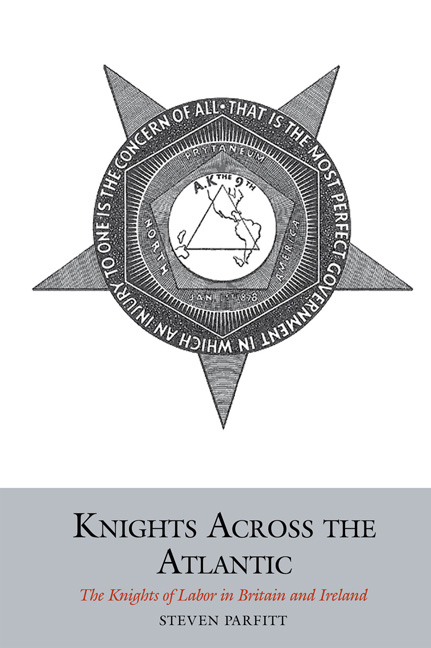Book contents
- Frontmatter
- Contents
- Acknowledgements
- Introduction: The World of the Knights of Labor
- 1 Origins
- 2 The Rise of a Transnational Movement
- 3 Organisation, Culture and Gender
- 4 The Knights in Industry
- 5 The Knights and Politics
- 6 The Knights and the Unions
- 7 The Fall of a Transnational Movement
- Conclusion: The Knights of Labor in Britain and Ireland
- Appendix: List of Known Assemblies of the Knights of Labor in England, Scotland, Wales and Ireland
- Bibliography
- Index
6 - The Knights and the Unions
- Frontmatter
- Contents
- Acknowledgements
- Introduction: The World of the Knights of Labor
- 1 Origins
- 2 The Rise of a Transnational Movement
- 3 Organisation, Culture and Gender
- 4 The Knights in Industry
- 5 The Knights and Politics
- 6 The Knights and the Unions
- 7 The Fall of a Transnational Movement
- Conclusion: The Knights of Labor in Britain and Ireland
- Appendix: List of Known Assemblies of the Knights of Labor in England, Scotland, Wales and Ireland
- Bibliography
- Index
Summary
No account of the Great Upheaval is complete without the story of the Knights of Labor and the trade unionists of the American Federation of Labor. Amidst the titanic industrial and political struggles between capital and labour, the American labour movement, divided mainly into these two camps, fought its own internecine war until the Knights were driven off the field and the Federation, weakened but intact, was left to lead organised labour into the twentieth century. The outcome of this struggle still shapes the way we understand American labour history. John Commons, Selig Perlman and Gerald Grob, among others, argued that the AFL's victory represented the triumph of rational trade unionism, concerned solely with narrow economic interests, over the utopian dreams of the Knights of Labor. Norman Ware and most subsequent historians see that victory as a retreat, however necessary it might have been, from the powerful and wide-ranging organisation of American workers that the Knights briefly maintained in the mid-1880s. Black and women workers suffered most from that retreat. The American labour movement would not achieve the proportion of workers organised by the Knights until the 1930s. Indeed, the Knights organised proportionally more workers than the American labour movement does today.
The labour civil war of the mid-1880s should not obscure other trends in the history of the Knights and the unions, however. They were not always or necessarily enemies. In the first decade and a half of the Order's history, the Knights established cordial ties with many trade unionists. The Knights became an attractive option for many of the latter during the 1870s as poor trade and failed strikes decimated the unions. Some trade unionists became Knights. Whole unions even joined the Order as a body. Cooperation was as much a part of the story as conflict, even if conflict ultimately proved more decisive. Equally decisive was the absence of any meaningful rival to the Knights until the revival of the trade unions in the mid-1880s.
The same considerations governed the Order's growth outside North America. Belgian Knights exploited the absence of trade unions in the glass and coal industries of the Charleroi basin. Knights in New Zealand grew rapidly in the aftermath of a large failed strike in 1890, and ‘the early 1890s was the era of KOL activists,’ as Robert Weir writes, ‘for the simple reason that they didn't have a lot of competition.’
- Type
- Chapter
- Information
- Knights Across the AtlanticThe Knights of Labor in Britain and Ireland, pp. 164 - 195Publisher: Liverpool University PressPrint publication year: 2016



